Impact of Entrepreneurship and SMEs on UK Economy: Report
VerifiedAdded on 2023/01/19
|17
|5148
|62
Report
AI Summary
This report delves into the multifaceted world of entrepreneurship and its profound impact on the UK economy. It begins by examining diverse entrepreneurial ventures, including small businesses, scalable startups, large-scale enterprises, and social entrepreneurship, highlighting their distinct characteristics and contributions. The report then analyzes the differences and similarities between these ventures, providing a comparative perspective. A key focus is on interpreting and assessing statistics to measure the impact of SMEs on the UK economy, emphasizing their crucial role in job creation and economic growth. Furthermore, the report explores the characteristics, traits, and skills that distinguish successful entrepreneurs from traditional business managers, examining the entrepreneurial personality and its reflection on motivation and mindset. The report also explores the background and experience of entrepreneurs. Overall, the report offers a comprehensive overview of entrepreneurship, its various forms, its impact on the UK economy, and the key attributes of successful entrepreneurs.

ENTREPRENEURSHIP
AND SMALL
BUSINESS
MANAGEMENT
AND SMALL
BUSINESS
MANAGEMENT
Paraphrase This Document
Need a fresh take? Get an instant paraphrase of this document with our AI Paraphraser
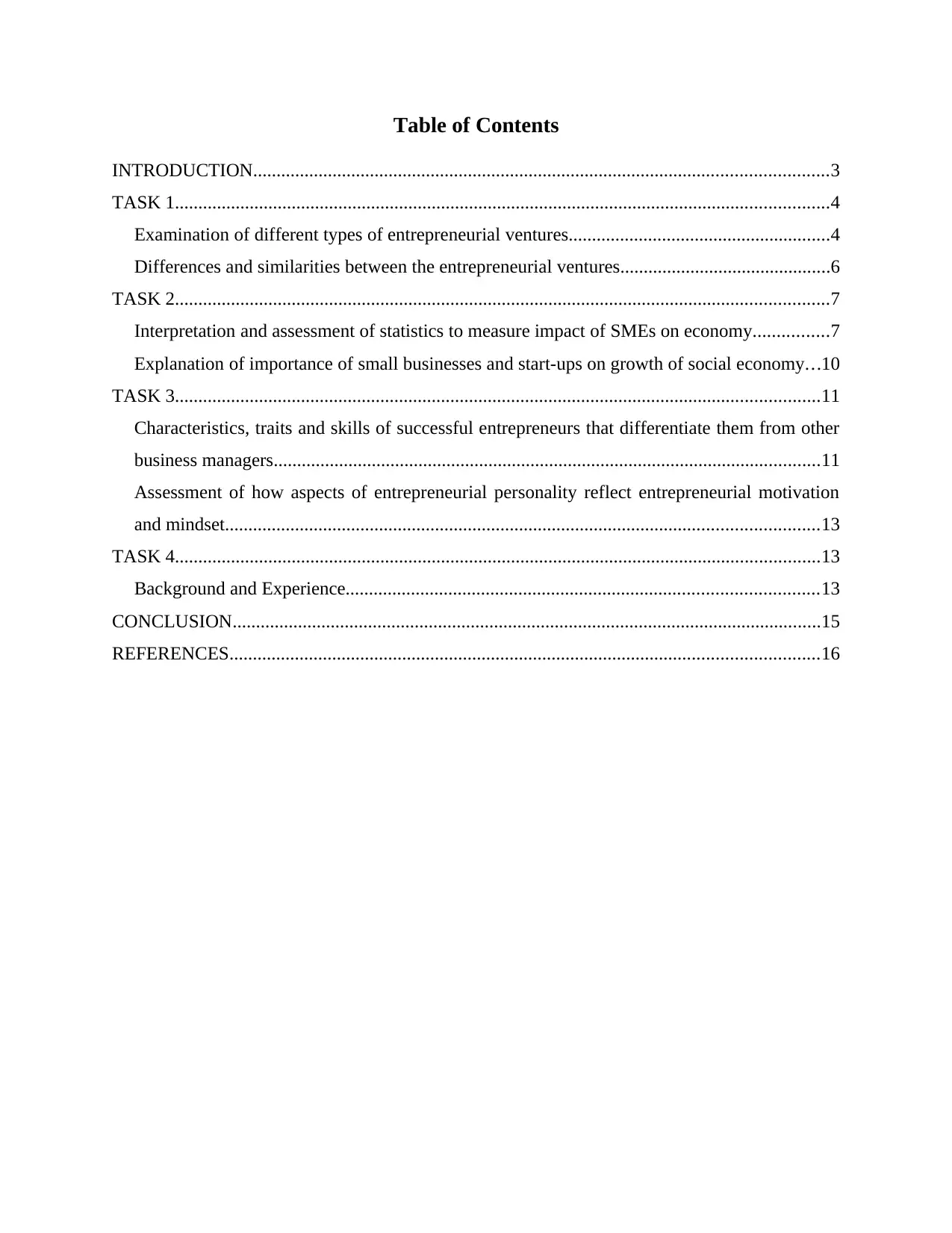
Table of Contents
INTRODUCTION...........................................................................................................................3
TASK 1............................................................................................................................................4
Examination of different types of entrepreneurial ventures........................................................4
Differences and similarities between the entrepreneurial ventures.............................................6
TASK 2............................................................................................................................................7
Interpretation and assessment of statistics to measure impact of SMEs on economy................7
Explanation of importance of small businesses and start-ups on growth of social economy...10
TASK 3..........................................................................................................................................11
Characteristics, traits and skills of successful entrepreneurs that differentiate them from other
business managers.....................................................................................................................11
Assessment of how aspects of entrepreneurial personality reflect entrepreneurial motivation
and mindset...............................................................................................................................13
TASK 4..........................................................................................................................................13
Background and Experience.....................................................................................................13
CONCLUSION..............................................................................................................................15
REFERENCES..............................................................................................................................16
INTRODUCTION...........................................................................................................................3
TASK 1............................................................................................................................................4
Examination of different types of entrepreneurial ventures........................................................4
Differences and similarities between the entrepreneurial ventures.............................................6
TASK 2............................................................................................................................................7
Interpretation and assessment of statistics to measure impact of SMEs on economy................7
Explanation of importance of small businesses and start-ups on growth of social economy...10
TASK 3..........................................................................................................................................11
Characteristics, traits and skills of successful entrepreneurs that differentiate them from other
business managers.....................................................................................................................11
Assessment of how aspects of entrepreneurial personality reflect entrepreneurial motivation
and mindset...............................................................................................................................13
TASK 4..........................................................................................................................................13
Background and Experience.....................................................................................................13
CONCLUSION..............................................................................................................................15
REFERENCES..............................................................................................................................16
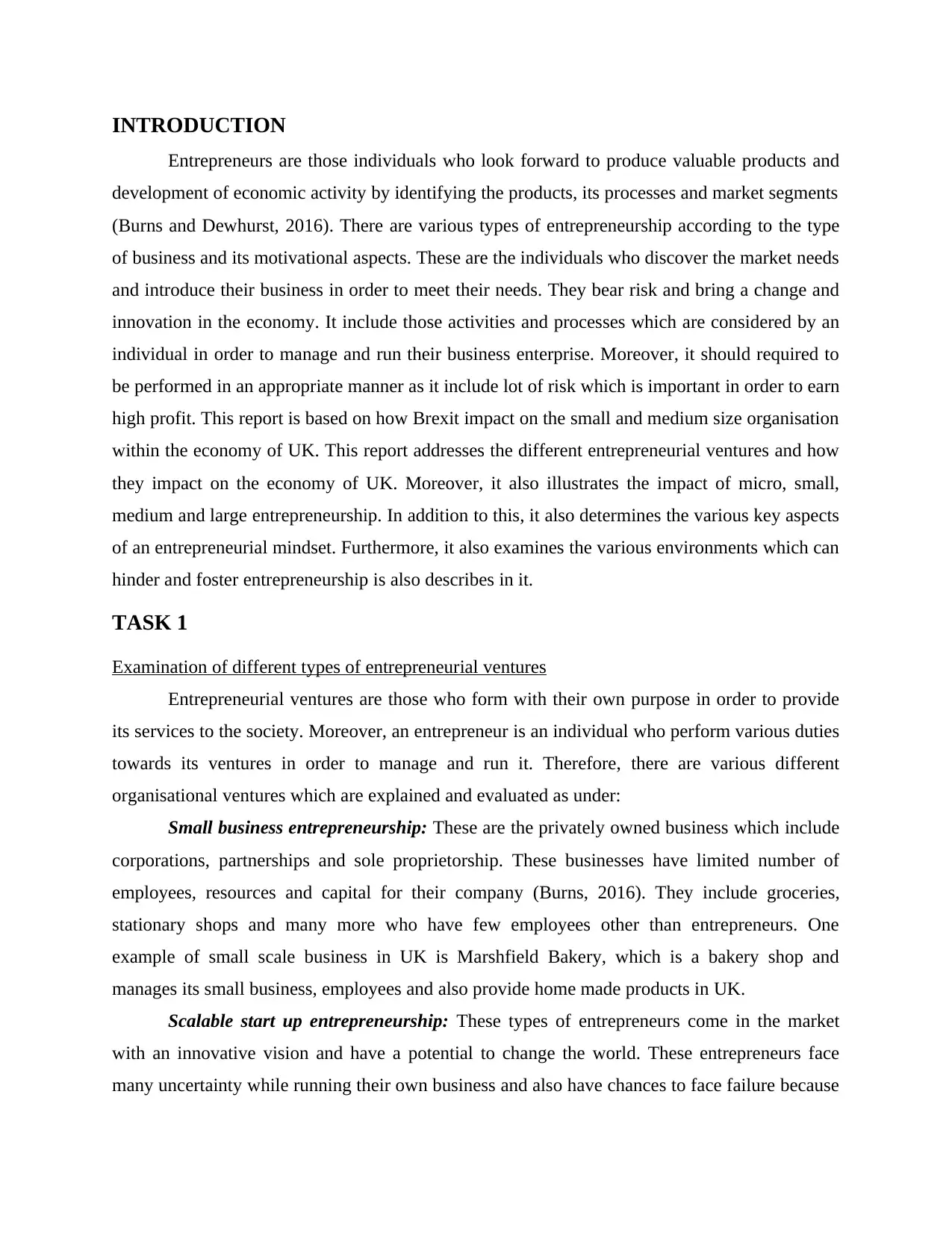
INTRODUCTION
Entrepreneurs are those individuals who look forward to produce valuable products and
development of economic activity by identifying the products, its processes and market segments
(Burns and Dewhurst, 2016). There are various types of entrepreneurship according to the type
of business and its motivational aspects. These are the individuals who discover the market needs
and introduce their business in order to meet their needs. They bear risk and bring a change and
innovation in the economy. It include those activities and processes which are considered by an
individual in order to manage and run their business enterprise. Moreover, it should required to
be performed in an appropriate manner as it include lot of risk which is important in order to earn
high profit. This report is based on how Brexit impact on the small and medium size organisation
within the economy of UK. This report addresses the different entrepreneurial ventures and how
they impact on the economy of UK. Moreover, it also illustrates the impact of micro, small,
medium and large entrepreneurship. In addition to this, it also determines the various key aspects
of an entrepreneurial mindset. Furthermore, it also examines the various environments which can
hinder and foster entrepreneurship is also describes in it.
TASK 1
Examination of different types of entrepreneurial ventures
Entrepreneurial ventures are those who form with their own purpose in order to provide
its services to the society. Moreover, an entrepreneur is an individual who perform various duties
towards its ventures in order to manage and run it. Therefore, there are various different
organisational ventures which are explained and evaluated as under:
Small business entrepreneurship: These are the privately owned business which include
corporations, partnerships and sole proprietorship. These businesses have limited number of
employees, resources and capital for their company (Burns, 2016). They include groceries,
stationary shops and many more who have few employees other than entrepreneurs. One
example of small scale business in UK is Marshfield Bakery, which is a bakery shop and
manages its small business, employees and also provide home made products in UK.
Scalable start up entrepreneurship: These types of entrepreneurs come in the market
with an innovative vision and have a potential to change the world. These entrepreneurs face
many uncertainty while running their own business and also have chances to face failure because
Entrepreneurs are those individuals who look forward to produce valuable products and
development of economic activity by identifying the products, its processes and market segments
(Burns and Dewhurst, 2016). There are various types of entrepreneurship according to the type
of business and its motivational aspects. These are the individuals who discover the market needs
and introduce their business in order to meet their needs. They bear risk and bring a change and
innovation in the economy. It include those activities and processes which are considered by an
individual in order to manage and run their business enterprise. Moreover, it should required to
be performed in an appropriate manner as it include lot of risk which is important in order to earn
high profit. This report is based on how Brexit impact on the small and medium size organisation
within the economy of UK. This report addresses the different entrepreneurial ventures and how
they impact on the economy of UK. Moreover, it also illustrates the impact of micro, small,
medium and large entrepreneurship. In addition to this, it also determines the various key aspects
of an entrepreneurial mindset. Furthermore, it also examines the various environments which can
hinder and foster entrepreneurship is also describes in it.
TASK 1
Examination of different types of entrepreneurial ventures
Entrepreneurial ventures are those who form with their own purpose in order to provide
its services to the society. Moreover, an entrepreneur is an individual who perform various duties
towards its ventures in order to manage and run it. Therefore, there are various different
organisational ventures which are explained and evaluated as under:
Small business entrepreneurship: These are the privately owned business which include
corporations, partnerships and sole proprietorship. These businesses have limited number of
employees, resources and capital for their company (Burns, 2016). They include groceries,
stationary shops and many more who have few employees other than entrepreneurs. One
example of small scale business in UK is Marshfield Bakery, which is a bakery shop and
manages its small business, employees and also provide home made products in UK.
Scalable start up entrepreneurship: These types of entrepreneurs come in the market
with an innovative vision and have a potential to change the world. These entrepreneurs face
many uncertainty while running their own business and also have chances to face failure because
⊘ This is a preview!⊘
Do you want full access?
Subscribe today to unlock all pages.

Trusted by 1+ million students worldwide
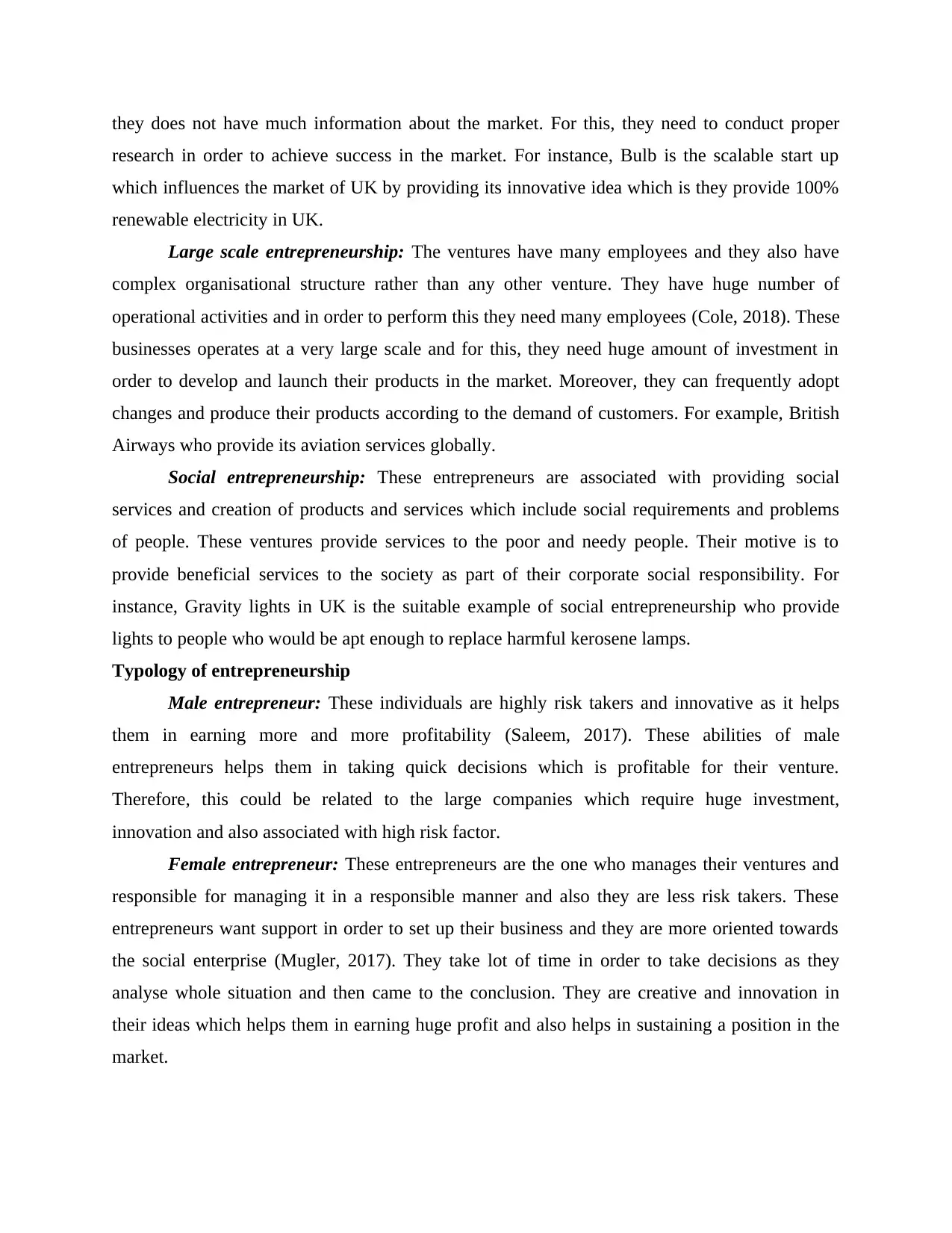
they does not have much information about the market. For this, they need to conduct proper
research in order to achieve success in the market. For instance, Bulb is the scalable start up
which influences the market of UK by providing its innovative idea which is they provide 100%
renewable electricity in UK.
Large scale entrepreneurship: The ventures have many employees and they also have
complex organisational structure rather than any other venture. They have huge number of
operational activities and in order to perform this they need many employees (Cole, 2018). These
businesses operates at a very large scale and for this, they need huge amount of investment in
order to develop and launch their products in the market. Moreover, they can frequently adopt
changes and produce their products according to the demand of customers. For example, British
Airways who provide its aviation services globally.
Social entrepreneurship: These entrepreneurs are associated with providing social
services and creation of products and services which include social requirements and problems
of people. These ventures provide services to the poor and needy people. Their motive is to
provide beneficial services to the society as part of their corporate social responsibility. For
instance, Gravity lights in UK is the suitable example of social entrepreneurship who provide
lights to people who would be apt enough to replace harmful kerosene lamps.
Typology of entrepreneurship
Male entrepreneur: These individuals are highly risk takers and innovative as it helps
them in earning more and more profitability (Saleem, 2017). These abilities of male
entrepreneurs helps them in taking quick decisions which is profitable for their venture.
Therefore, this could be related to the large companies which require huge investment,
innovation and also associated with high risk factor.
Female entrepreneur: These entrepreneurs are the one who manages their ventures and
responsible for managing it in a responsible manner and also they are less risk takers. These
entrepreneurs want support in order to set up their business and they are more oriented towards
the social enterprise (Mugler, 2017). They take lot of time in order to take decisions as they
analyse whole situation and then came to the conclusion. They are creative and innovation in
their ideas which helps them in earning huge profit and also helps in sustaining a position in the
market.
research in order to achieve success in the market. For instance, Bulb is the scalable start up
which influences the market of UK by providing its innovative idea which is they provide 100%
renewable electricity in UK.
Large scale entrepreneurship: The ventures have many employees and they also have
complex organisational structure rather than any other venture. They have huge number of
operational activities and in order to perform this they need many employees (Cole, 2018). These
businesses operates at a very large scale and for this, they need huge amount of investment in
order to develop and launch their products in the market. Moreover, they can frequently adopt
changes and produce their products according to the demand of customers. For example, British
Airways who provide its aviation services globally.
Social entrepreneurship: These entrepreneurs are associated with providing social
services and creation of products and services which include social requirements and problems
of people. These ventures provide services to the poor and needy people. Their motive is to
provide beneficial services to the society as part of their corporate social responsibility. For
instance, Gravity lights in UK is the suitable example of social entrepreneurship who provide
lights to people who would be apt enough to replace harmful kerosene lamps.
Typology of entrepreneurship
Male entrepreneur: These individuals are highly risk takers and innovative as it helps
them in earning more and more profitability (Saleem, 2017). These abilities of male
entrepreneurs helps them in taking quick decisions which is profitable for their venture.
Therefore, this could be related to the large companies which require huge investment,
innovation and also associated with high risk factor.
Female entrepreneur: These entrepreneurs are the one who manages their ventures and
responsible for managing it in a responsible manner and also they are less risk takers. These
entrepreneurs want support in order to set up their business and they are more oriented towards
the social enterprise (Mugler, 2017). They take lot of time in order to take decisions as they
analyse whole situation and then came to the conclusion. They are creative and innovation in
their ideas which helps them in earning huge profit and also helps in sustaining a position in the
market.
Paraphrase This Document
Need a fresh take? Get an instant paraphrase of this document with our AI Paraphraser
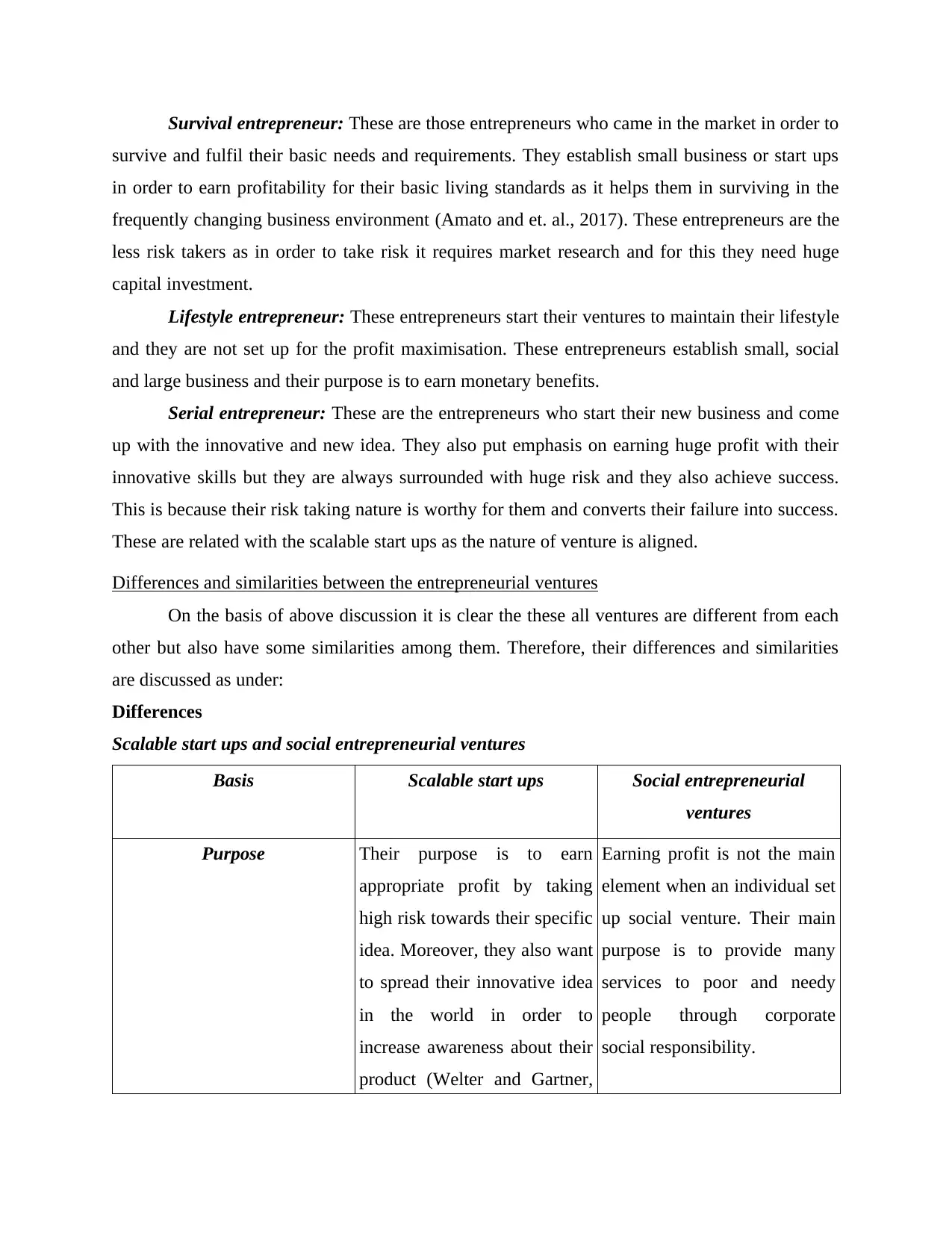
Survival entrepreneur: These are those entrepreneurs who came in the market in order to
survive and fulfil their basic needs and requirements. They establish small business or start ups
in order to earn profitability for their basic living standards as it helps them in surviving in the
frequently changing business environment (Amato and et. al., 2017). These entrepreneurs are the
less risk takers as in order to take risk it requires market research and for this they need huge
capital investment.
Lifestyle entrepreneur: These entrepreneurs start their ventures to maintain their lifestyle
and they are not set up for the profit maximisation. These entrepreneurs establish small, social
and large business and their purpose is to earn monetary benefits.
Serial entrepreneur: These are the entrepreneurs who start their new business and come
up with the innovative and new idea. They also put emphasis on earning huge profit with their
innovative skills but they are always surrounded with huge risk and they also achieve success.
This is because their risk taking nature is worthy for them and converts their failure into success.
These are related with the scalable start ups as the nature of venture is aligned.
Differences and similarities between the entrepreneurial ventures
On the basis of above discussion it is clear the these all ventures are different from each
other but also have some similarities among them. Therefore, their differences and similarities
are discussed as under:
Differences
Scalable start ups and social entrepreneurial ventures
Basis Scalable start ups Social entrepreneurial
ventures
Purpose Their purpose is to earn
appropriate profit by taking
high risk towards their specific
idea. Moreover, they also want
to spread their innovative idea
in the world in order to
increase awareness about their
product (Welter and Gartner,
Earning profit is not the main
element when an individual set
up social venture. Their main
purpose is to provide many
services to poor and needy
people through corporate
social responsibility.
survive and fulfil their basic needs and requirements. They establish small business or start ups
in order to earn profitability for their basic living standards as it helps them in surviving in the
frequently changing business environment (Amato and et. al., 2017). These entrepreneurs are the
less risk takers as in order to take risk it requires market research and for this they need huge
capital investment.
Lifestyle entrepreneur: These entrepreneurs start their ventures to maintain their lifestyle
and they are not set up for the profit maximisation. These entrepreneurs establish small, social
and large business and their purpose is to earn monetary benefits.
Serial entrepreneur: These are the entrepreneurs who start their new business and come
up with the innovative and new idea. They also put emphasis on earning huge profit with their
innovative skills but they are always surrounded with huge risk and they also achieve success.
This is because their risk taking nature is worthy for them and converts their failure into success.
These are related with the scalable start ups as the nature of venture is aligned.
Differences and similarities between the entrepreneurial ventures
On the basis of above discussion it is clear the these all ventures are different from each
other but also have some similarities among them. Therefore, their differences and similarities
are discussed as under:
Differences
Scalable start ups and social entrepreneurial ventures
Basis Scalable start ups Social entrepreneurial
ventures
Purpose Their purpose is to earn
appropriate profit by taking
high risk towards their specific
idea. Moreover, they also want
to spread their innovative idea
in the world in order to
increase awareness about their
product (Welter and Gartner,
Earning profit is not the main
element when an individual set
up social venture. Their main
purpose is to provide many
services to poor and needy
people through corporate
social responsibility.
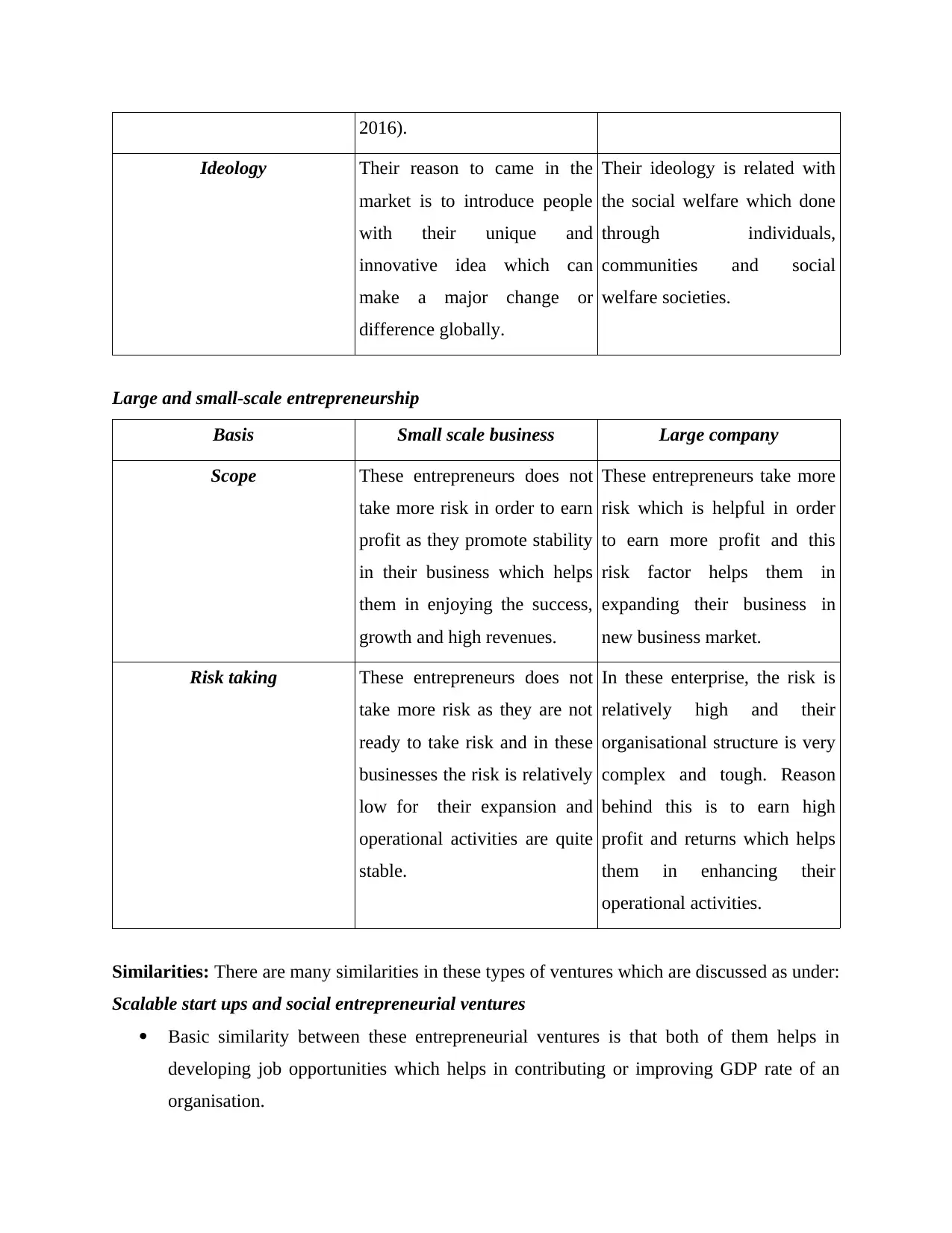
2016).
Ideology Their reason to came in the
market is to introduce people
with their unique and
innovative idea which can
make a major change or
difference globally.
Their ideology is related with
the social welfare which done
through individuals,
communities and social
welfare societies.
Large and small-scale entrepreneurship
Basis Small scale business Large company
Scope These entrepreneurs does not
take more risk in order to earn
profit as they promote stability
in their business which helps
them in enjoying the success,
growth and high revenues.
These entrepreneurs take more
risk which is helpful in order
to earn more profit and this
risk factor helps them in
expanding their business in
new business market.
Risk taking These entrepreneurs does not
take more risk as they are not
ready to take risk and in these
businesses the risk is relatively
low for their expansion and
operational activities are quite
stable.
In these enterprise, the risk is
relatively high and their
organisational structure is very
complex and tough. Reason
behind this is to earn high
profit and returns which helps
them in enhancing their
operational activities.
Similarities: There are many similarities in these types of ventures which are discussed as under:
Scalable start ups and social entrepreneurial ventures
Basic similarity between these entrepreneurial ventures is that both of them helps in
developing job opportunities which helps in contributing or improving GDP rate of an
organisation.
Ideology Their reason to came in the
market is to introduce people
with their unique and
innovative idea which can
make a major change or
difference globally.
Their ideology is related with
the social welfare which done
through individuals,
communities and social
welfare societies.
Large and small-scale entrepreneurship
Basis Small scale business Large company
Scope These entrepreneurs does not
take more risk in order to earn
profit as they promote stability
in their business which helps
them in enjoying the success,
growth and high revenues.
These entrepreneurs take more
risk which is helpful in order
to earn more profit and this
risk factor helps them in
expanding their business in
new business market.
Risk taking These entrepreneurs does not
take more risk as they are not
ready to take risk and in these
businesses the risk is relatively
low for their expansion and
operational activities are quite
stable.
In these enterprise, the risk is
relatively high and their
organisational structure is very
complex and tough. Reason
behind this is to earn high
profit and returns which helps
them in enhancing their
operational activities.
Similarities: There are many similarities in these types of ventures which are discussed as under:
Scalable start ups and social entrepreneurial ventures
Basic similarity between these entrepreneurial ventures is that both of them helps in
developing job opportunities which helps in contributing or improving GDP rate of an
organisation.
⊘ This is a preview!⊘
Do you want full access?
Subscribe today to unlock all pages.

Trusted by 1+ million students worldwide
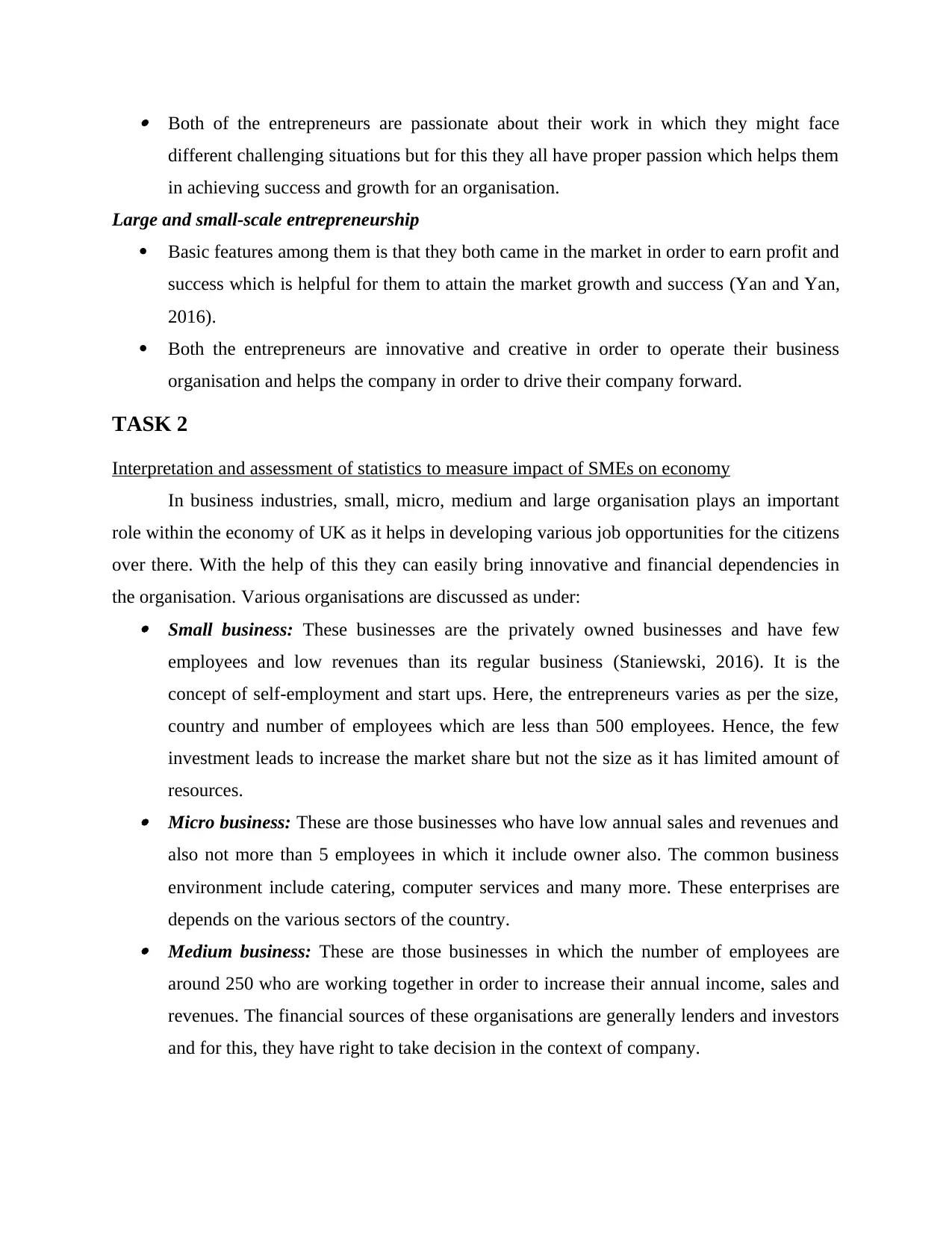
Both of the entrepreneurs are passionate about their work in which they might face
different challenging situations but for this they all have proper passion which helps them
in achieving success and growth for an organisation.
Large and small-scale entrepreneurship
Basic features among them is that they both came in the market in order to earn profit and
success which is helpful for them to attain the market growth and success (Yan and Yan,
2016).
Both the entrepreneurs are innovative and creative in order to operate their business
organisation and helps the company in order to drive their company forward.
TASK 2
Interpretation and assessment of statistics to measure impact of SMEs on economy
In business industries, small, micro, medium and large organisation plays an important
role within the economy of UK as it helps in developing various job opportunities for the citizens
over there. With the help of this they can easily bring innovative and financial dependencies in
the organisation. Various organisations are discussed as under: Small business: These businesses are the privately owned businesses and have few
employees and low revenues than its regular business (Staniewski, 2016). It is the
concept of self-employment and start ups. Here, the entrepreneurs varies as per the size,
country and number of employees which are less than 500 employees. Hence, the few
investment leads to increase the market share but not the size as it has limited amount of
resources. Micro business: These are those businesses who have low annual sales and revenues and
also not more than 5 employees in which it include owner also. The common business
environment include catering, computer services and many more. These enterprises are
depends on the various sectors of the country. Medium business: These are those businesses in which the number of employees are
around 250 who are working together in order to increase their annual income, sales and
revenues. The financial sources of these organisations are generally lenders and investors
and for this, they have right to take decision in the context of company.
different challenging situations but for this they all have proper passion which helps them
in achieving success and growth for an organisation.
Large and small-scale entrepreneurship
Basic features among them is that they both came in the market in order to earn profit and
success which is helpful for them to attain the market growth and success (Yan and Yan,
2016).
Both the entrepreneurs are innovative and creative in order to operate their business
organisation and helps the company in order to drive their company forward.
TASK 2
Interpretation and assessment of statistics to measure impact of SMEs on economy
In business industries, small, micro, medium and large organisation plays an important
role within the economy of UK as it helps in developing various job opportunities for the citizens
over there. With the help of this they can easily bring innovative and financial dependencies in
the organisation. Various organisations are discussed as under: Small business: These businesses are the privately owned businesses and have few
employees and low revenues than its regular business (Staniewski, 2016). It is the
concept of self-employment and start ups. Here, the entrepreneurs varies as per the size,
country and number of employees which are less than 500 employees. Hence, the few
investment leads to increase the market share but not the size as it has limited amount of
resources. Micro business: These are those businesses who have low annual sales and revenues and
also not more than 5 employees in which it include owner also. The common business
environment include catering, computer services and many more. These enterprises are
depends on the various sectors of the country. Medium business: These are those businesses in which the number of employees are
around 250 who are working together in order to increase their annual income, sales and
revenues. The financial sources of these organisations are generally lenders and investors
and for this, they have right to take decision in the context of company.
Paraphrase This Document
Need a fresh take? Get an instant paraphrase of this document with our AI Paraphraser
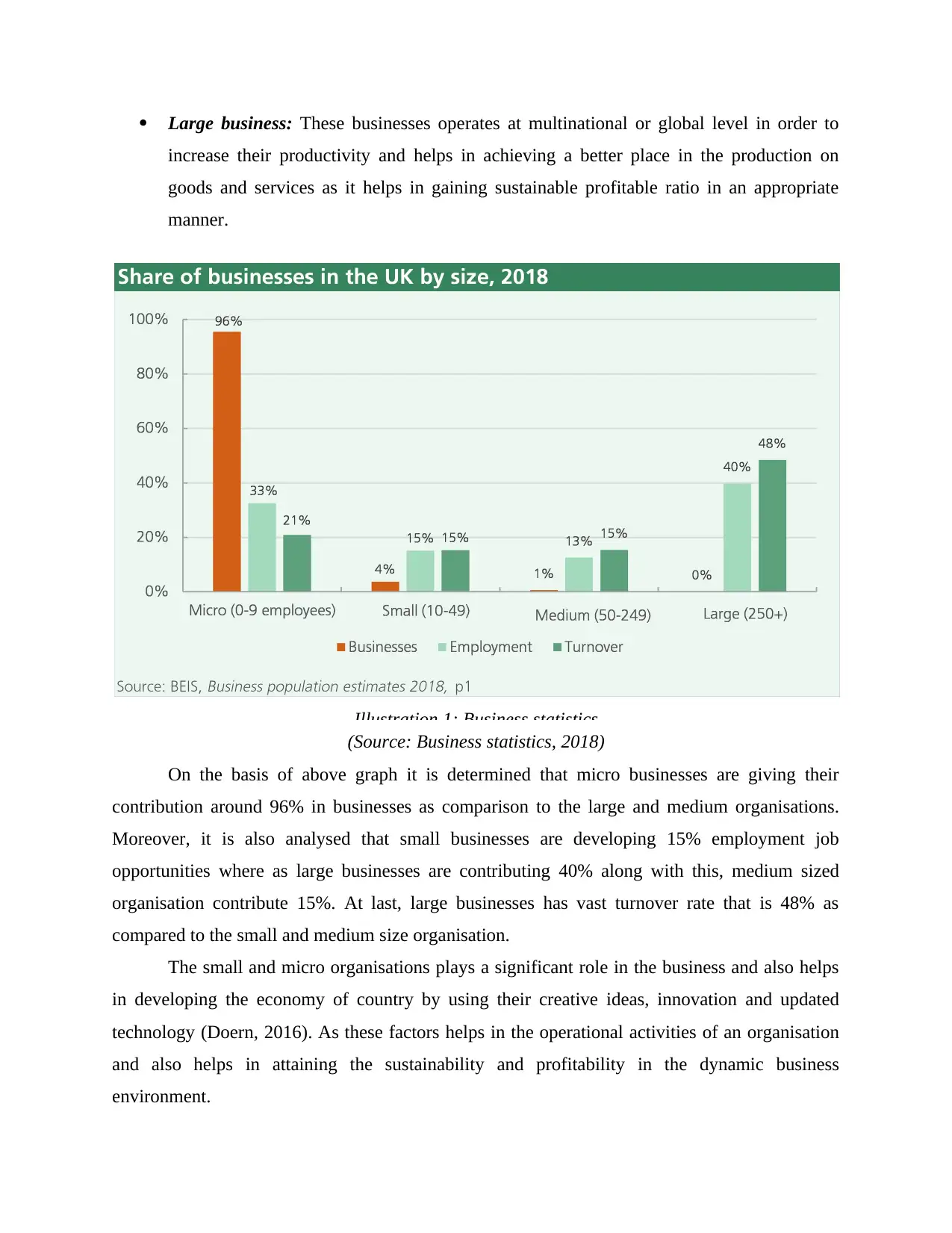
Large business: These businesses operates at multinational or global level in order to
increase their productivity and helps in achieving a better place in the production on
goods and services as it helps in gaining sustainable profitable ratio in an appropriate
manner.
(Source: Business statistics, 2018)
On the basis of above graph it is determined that micro businesses are giving their
contribution around 96% in businesses as comparison to the large and medium organisations.
Moreover, it is also analysed that small businesses are developing 15% employment job
opportunities where as large businesses are contributing 40% along with this, medium sized
organisation contribute 15%. At last, large businesses has vast turnover rate that is 48% as
compared to the small and medium size organisation.
The small and micro organisations plays a significant role in the business and also helps
in developing the economy of country by using their creative ideas, innovation and updated
technology (Doern, 2016). As these factors helps in the operational activities of an organisation
and also helps in attaining the sustainability and profitability in the dynamic business
environment.
Illustration 1: Business statistics
increase their productivity and helps in achieving a better place in the production on
goods and services as it helps in gaining sustainable profitable ratio in an appropriate
manner.
(Source: Business statistics, 2018)
On the basis of above graph it is determined that micro businesses are giving their
contribution around 96% in businesses as comparison to the large and medium organisations.
Moreover, it is also analysed that small businesses are developing 15% employment job
opportunities where as large businesses are contributing 40% along with this, medium sized
organisation contribute 15%. At last, large businesses has vast turnover rate that is 48% as
compared to the small and medium size organisation.
The small and micro organisations plays a significant role in the business and also helps
in developing the economy of country by using their creative ideas, innovation and updated
technology (Doern, 2016). As these factors helps in the operational activities of an organisation
and also helps in attaining the sustainability and profitability in the dynamic business
environment.
Illustration 1: Business statistics
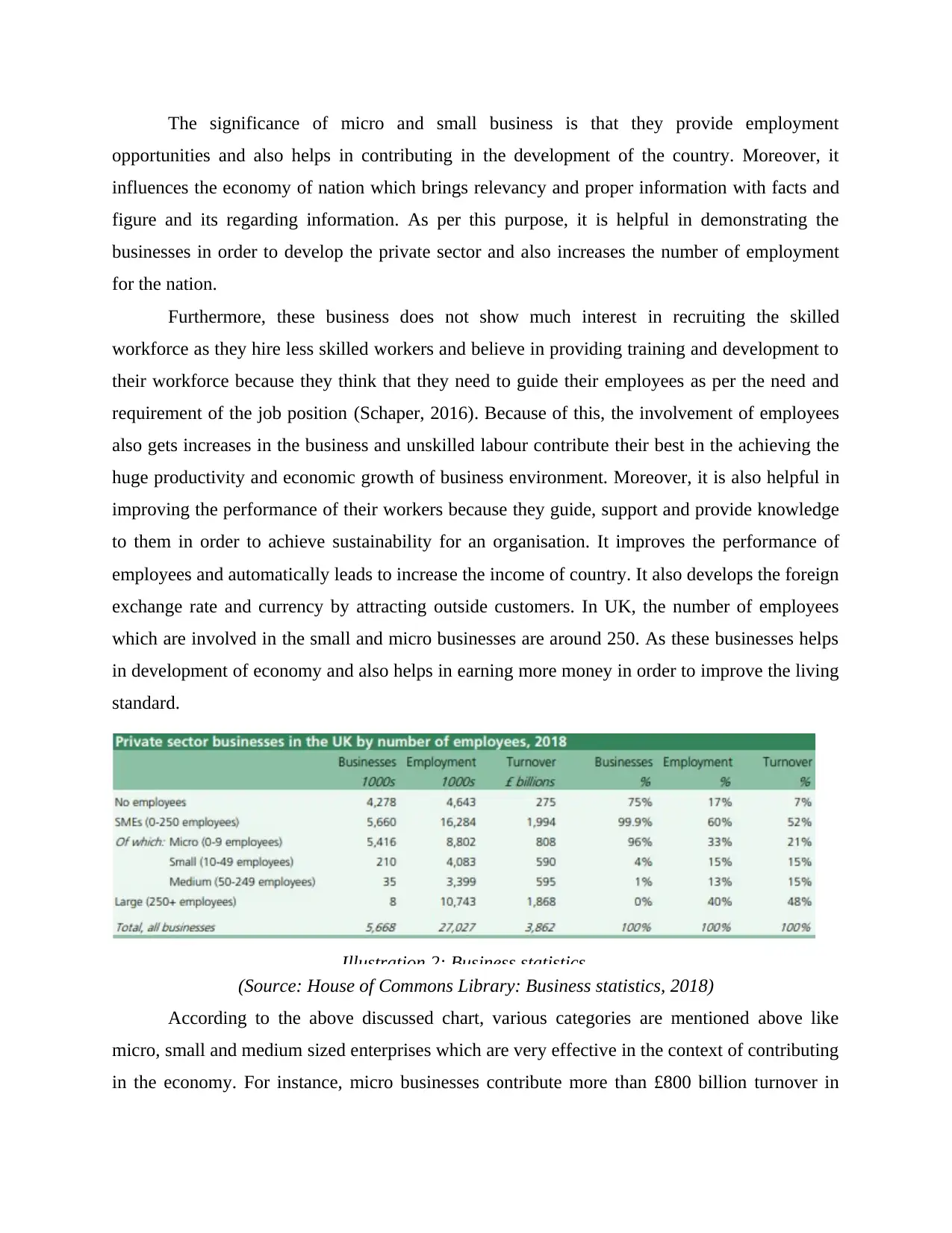
The significance of micro and small business is that they provide employment
opportunities and also helps in contributing in the development of the country. Moreover, it
influences the economy of nation which brings relevancy and proper information with facts and
figure and its regarding information. As per this purpose, it is helpful in demonstrating the
businesses in order to develop the private sector and also increases the number of employment
for the nation.
Furthermore, these business does not show much interest in recruiting the skilled
workforce as they hire less skilled workers and believe in providing training and development to
their workforce because they think that they need to guide their employees as per the need and
requirement of the job position (Schaper, 2016). Because of this, the involvement of employees
also gets increases in the business and unskilled labour contribute their best in the achieving the
huge productivity and economic growth of business environment. Moreover, it is also helpful in
improving the performance of their workers because they guide, support and provide knowledge
to them in order to achieve sustainability for an organisation. It improves the performance of
employees and automatically leads to increase the income of country. It also develops the foreign
exchange rate and currency by attracting outside customers. In UK, the number of employees
which are involved in the small and micro businesses are around 250. As these businesses helps
in development of economy and also helps in earning more money in order to improve the living
standard.
Illustration 2: Business statistics
(Source: House of Commons Library: Business statistics, 2018)
According to the above discussed chart, various categories are mentioned above like
micro, small and medium sized enterprises which are very effective in the context of contributing
in the economy. For instance, micro businesses contribute more than £800 billion turnover in
opportunities and also helps in contributing in the development of the country. Moreover, it
influences the economy of nation which brings relevancy and proper information with facts and
figure and its regarding information. As per this purpose, it is helpful in demonstrating the
businesses in order to develop the private sector and also increases the number of employment
for the nation.
Furthermore, these business does not show much interest in recruiting the skilled
workforce as they hire less skilled workers and believe in providing training and development to
their workforce because they think that they need to guide their employees as per the need and
requirement of the job position (Schaper, 2016). Because of this, the involvement of employees
also gets increases in the business and unskilled labour contribute their best in the achieving the
huge productivity and economic growth of business environment. Moreover, it is also helpful in
improving the performance of their workers because they guide, support and provide knowledge
to them in order to achieve sustainability for an organisation. It improves the performance of
employees and automatically leads to increase the income of country. It also develops the foreign
exchange rate and currency by attracting outside customers. In UK, the number of employees
which are involved in the small and micro businesses are around 250. As these businesses helps
in development of economy and also helps in earning more money in order to improve the living
standard.
Illustration 2: Business statistics
(Source: House of Commons Library: Business statistics, 2018)
According to the above discussed chart, various categories are mentioned above like
micro, small and medium sized enterprises which are very effective in the context of contributing
in the economy. For instance, micro businesses contribute more than £800 billion turnover in
⊘ This is a preview!⊘
Do you want full access?
Subscribe today to unlock all pages.

Trusted by 1+ million students worldwide
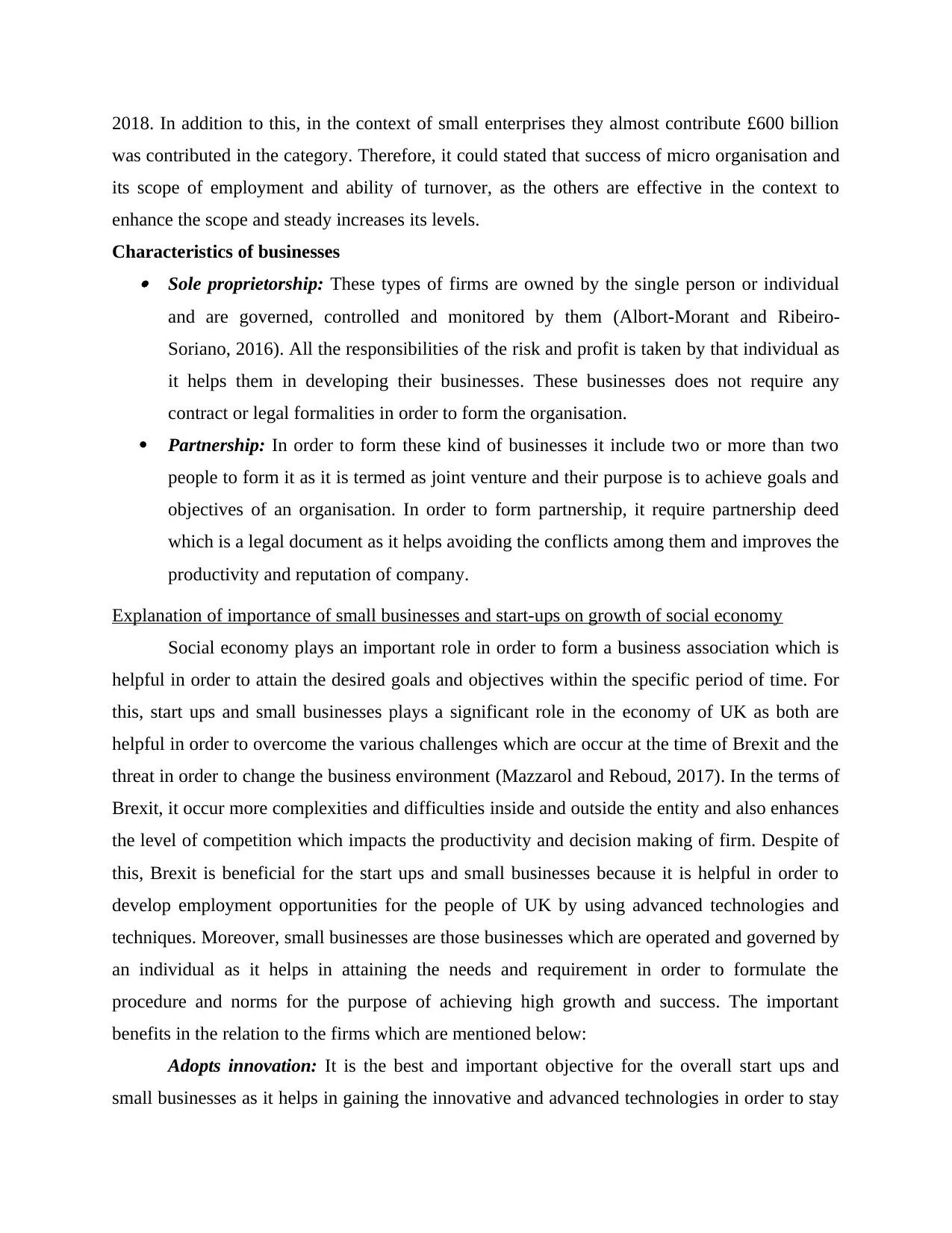
2018. In addition to this, in the context of small enterprises they almost contribute £600 billion
was contributed in the category. Therefore, it could stated that success of micro organisation and
its scope of employment and ability of turnover, as the others are effective in the context to
enhance the scope and steady increases its levels.
Characteristics of businesses Sole proprietorship: These types of firms are owned by the single person or individual
and are governed, controlled and monitored by them (Albort-Morant and Ribeiro-
Soriano, 2016). All the responsibilities of the risk and profit is taken by that individual as
it helps them in developing their businesses. These businesses does not require any
contract or legal formalities in order to form the organisation.
Partnership: In order to form these kind of businesses it include two or more than two
people to form it as it is termed as joint venture and their purpose is to achieve goals and
objectives of an organisation. In order to form partnership, it require partnership deed
which is a legal document as it helps avoiding the conflicts among them and improves the
productivity and reputation of company.
Explanation of importance of small businesses and start-ups on growth of social economy
Social economy plays an important role in order to form a business association which is
helpful in order to attain the desired goals and objectives within the specific period of time. For
this, start ups and small businesses plays a significant role in the economy of UK as both are
helpful in order to overcome the various challenges which are occur at the time of Brexit and the
threat in order to change the business environment (Mazzarol and Reboud, 2017). In the terms of
Brexit, it occur more complexities and difficulties inside and outside the entity and also enhances
the level of competition which impacts the productivity and decision making of firm. Despite of
this, Brexit is beneficial for the start ups and small businesses because it is helpful in order to
develop employment opportunities for the people of UK by using advanced technologies and
techniques. Moreover, small businesses are those businesses which are operated and governed by
an individual as it helps in attaining the needs and requirement in order to formulate the
procedure and norms for the purpose of achieving high growth and success. The important
benefits in the relation to the firms which are mentioned below:
Adopts innovation: It is the best and important objective for the overall start ups and
small businesses as it helps in gaining the innovative and advanced technologies in order to stay
was contributed in the category. Therefore, it could stated that success of micro organisation and
its scope of employment and ability of turnover, as the others are effective in the context to
enhance the scope and steady increases its levels.
Characteristics of businesses Sole proprietorship: These types of firms are owned by the single person or individual
and are governed, controlled and monitored by them (Albort-Morant and Ribeiro-
Soriano, 2016). All the responsibilities of the risk and profit is taken by that individual as
it helps them in developing their businesses. These businesses does not require any
contract or legal formalities in order to form the organisation.
Partnership: In order to form these kind of businesses it include two or more than two
people to form it as it is termed as joint venture and their purpose is to achieve goals and
objectives of an organisation. In order to form partnership, it require partnership deed
which is a legal document as it helps avoiding the conflicts among them and improves the
productivity and reputation of company.
Explanation of importance of small businesses and start-ups on growth of social economy
Social economy plays an important role in order to form a business association which is
helpful in order to attain the desired goals and objectives within the specific period of time. For
this, start ups and small businesses plays a significant role in the economy of UK as both are
helpful in order to overcome the various challenges which are occur at the time of Brexit and the
threat in order to change the business environment (Mazzarol and Reboud, 2017). In the terms of
Brexit, it occur more complexities and difficulties inside and outside the entity and also enhances
the level of competition which impacts the productivity and decision making of firm. Despite of
this, Brexit is beneficial for the start ups and small businesses because it is helpful in order to
develop employment opportunities for the people of UK by using advanced technologies and
techniques. Moreover, small businesses are those businesses which are operated and governed by
an individual as it helps in attaining the needs and requirement in order to formulate the
procedure and norms for the purpose of achieving high growth and success. The important
benefits in the relation to the firms which are mentioned below:
Adopts innovation: It is the best and important objective for the overall start ups and
small businesses as it helps in gaining the innovative and advanced technologies in order to stay
Paraphrase This Document
Need a fresh take? Get an instant paraphrase of this document with our AI Paraphraser
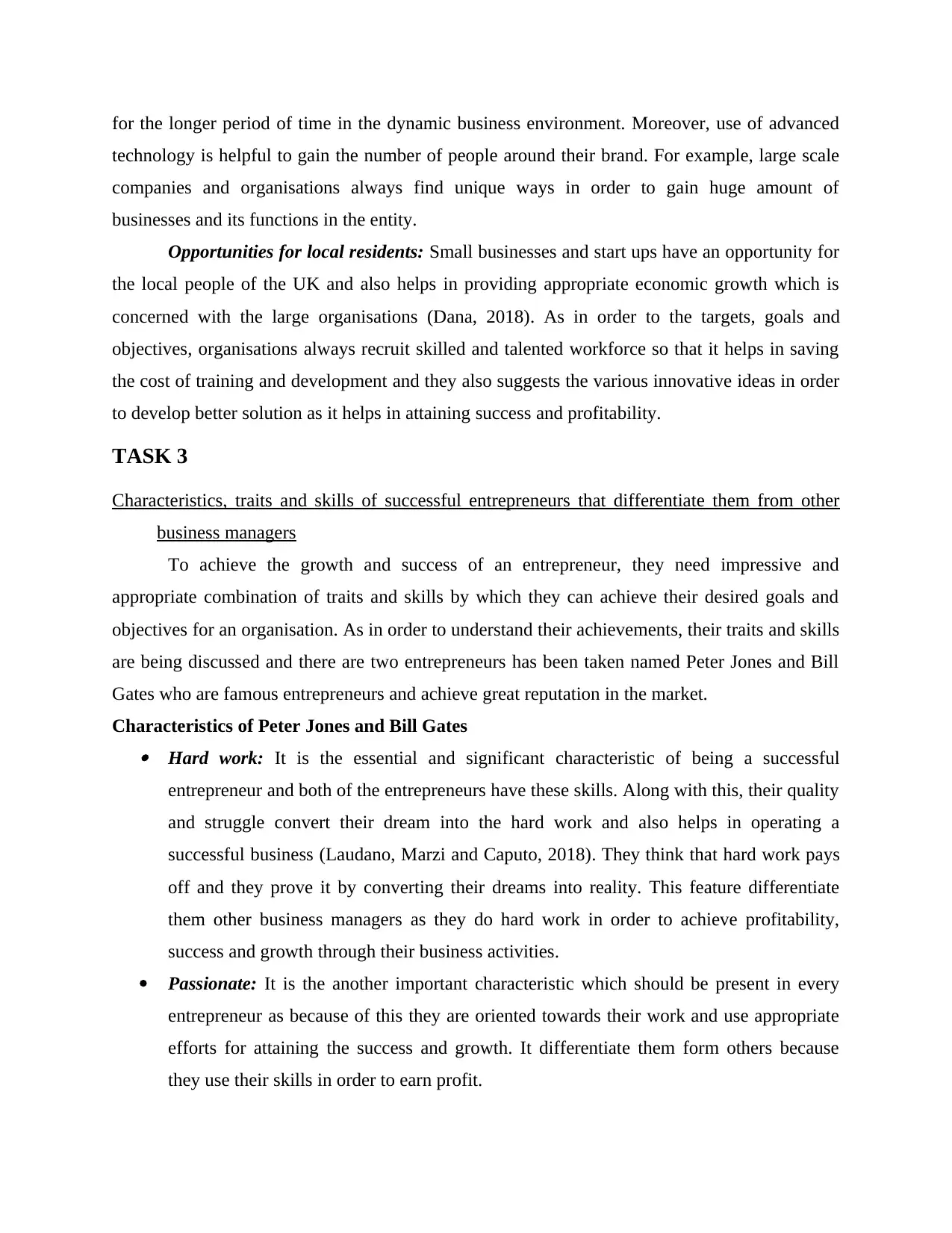
for the longer period of time in the dynamic business environment. Moreover, use of advanced
technology is helpful to gain the number of people around their brand. For example, large scale
companies and organisations always find unique ways in order to gain huge amount of
businesses and its functions in the entity.
Opportunities for local residents: Small businesses and start ups have an opportunity for
the local people of the UK and also helps in providing appropriate economic growth which is
concerned with the large organisations (Dana, 2018). As in order to the targets, goals and
objectives, organisations always recruit skilled and talented workforce so that it helps in saving
the cost of training and development and they also suggests the various innovative ideas in order
to develop better solution as it helps in attaining success and profitability.
TASK 3
Characteristics, traits and skills of successful entrepreneurs that differentiate them from other
business managers
To achieve the growth and success of an entrepreneur, they need impressive and
appropriate combination of traits and skills by which they can achieve their desired goals and
objectives for an organisation. As in order to understand their achievements, their traits and skills
are being discussed and there are two entrepreneurs has been taken named Peter Jones and Bill
Gates who are famous entrepreneurs and achieve great reputation in the market.
Characteristics of Peter Jones and Bill Gates Hard work: It is the essential and significant characteristic of being a successful
entrepreneur and both of the entrepreneurs have these skills. Along with this, their quality
and struggle convert their dream into the hard work and also helps in operating a
successful business (Laudano, Marzi and Caputo, 2018). They think that hard work pays
off and they prove it by converting their dreams into reality. This feature differentiate
them other business managers as they do hard work in order to achieve profitability,
success and growth through their business activities.
Passionate: It is the another important characteristic which should be present in every
entrepreneur as because of this they are oriented towards their work and use appropriate
efforts for attaining the success and growth. It differentiate them form others because
they use their skills in order to earn profit.
technology is helpful to gain the number of people around their brand. For example, large scale
companies and organisations always find unique ways in order to gain huge amount of
businesses and its functions in the entity.
Opportunities for local residents: Small businesses and start ups have an opportunity for
the local people of the UK and also helps in providing appropriate economic growth which is
concerned with the large organisations (Dana, 2018). As in order to the targets, goals and
objectives, organisations always recruit skilled and talented workforce so that it helps in saving
the cost of training and development and they also suggests the various innovative ideas in order
to develop better solution as it helps in attaining success and profitability.
TASK 3
Characteristics, traits and skills of successful entrepreneurs that differentiate them from other
business managers
To achieve the growth and success of an entrepreneur, they need impressive and
appropriate combination of traits and skills by which they can achieve their desired goals and
objectives for an organisation. As in order to understand their achievements, their traits and skills
are being discussed and there are two entrepreneurs has been taken named Peter Jones and Bill
Gates who are famous entrepreneurs and achieve great reputation in the market.
Characteristics of Peter Jones and Bill Gates Hard work: It is the essential and significant characteristic of being a successful
entrepreneur and both of the entrepreneurs have these skills. Along with this, their quality
and struggle convert their dream into the hard work and also helps in operating a
successful business (Laudano, Marzi and Caputo, 2018). They think that hard work pays
off and they prove it by converting their dreams into reality. This feature differentiate
them other business managers as they do hard work in order to achieve profitability,
success and growth through their business activities.
Passionate: It is the another important characteristic which should be present in every
entrepreneur as because of this they are oriented towards their work and use appropriate
efforts for attaining the success and growth. It differentiate them form others because
they use their skills in order to earn profit.
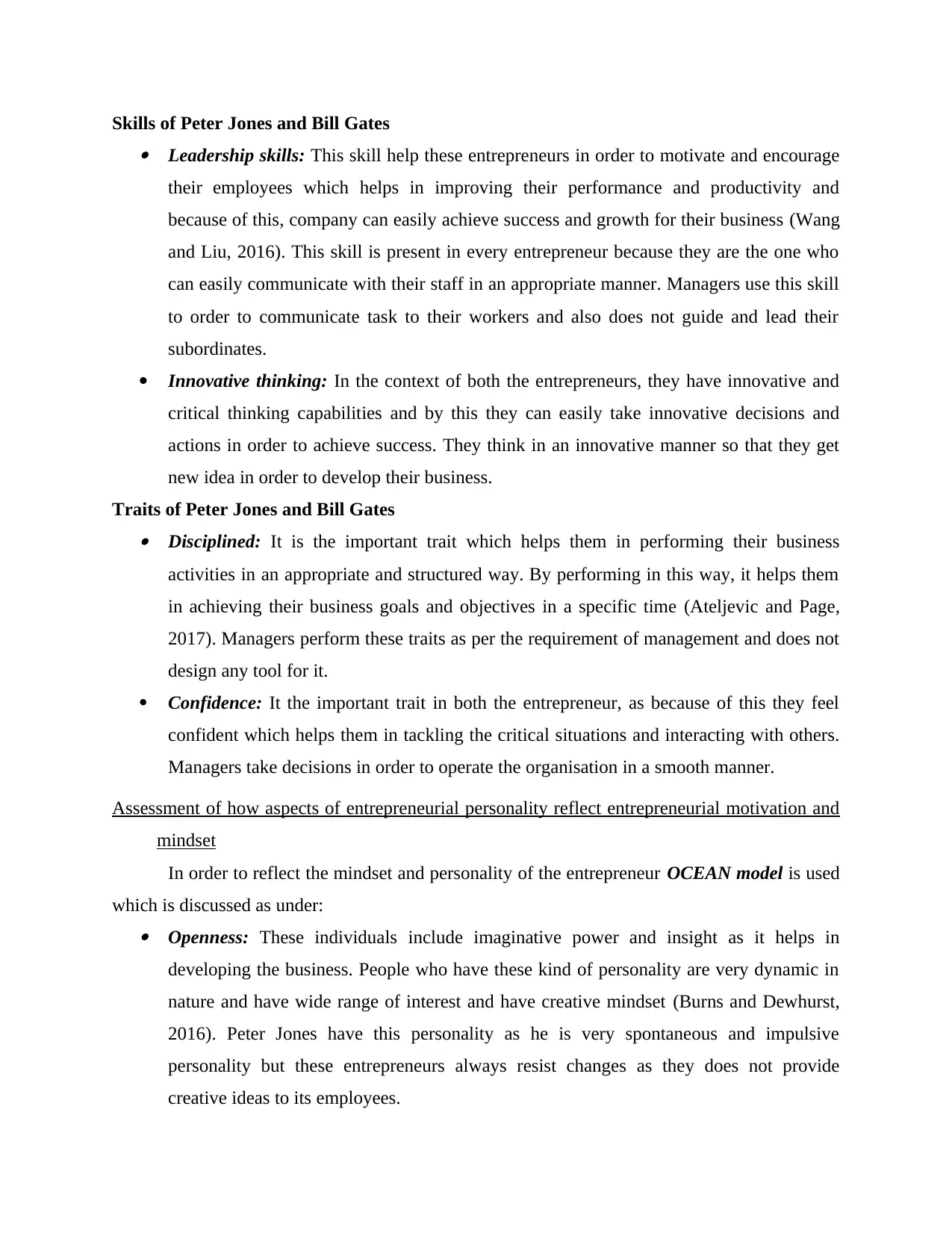
Skills of Peter Jones and Bill Gates Leadership skills: This skill help these entrepreneurs in order to motivate and encourage
their employees which helps in improving their performance and productivity and
because of this, company can easily achieve success and growth for their business (Wang
and Liu, 2016). This skill is present in every entrepreneur because they are the one who
can easily communicate with their staff in an appropriate manner. Managers use this skill
to order to communicate task to their workers and also does not guide and lead their
subordinates.
Innovative thinking: In the context of both the entrepreneurs, they have innovative and
critical thinking capabilities and by this they can easily take innovative decisions and
actions in order to achieve success. They think in an innovative manner so that they get
new idea in order to develop their business.
Traits of Peter Jones and Bill Gates Disciplined: It is the important trait which helps them in performing their business
activities in an appropriate and structured way. By performing in this way, it helps them
in achieving their business goals and objectives in a specific time (Ateljevic and Page,
2017). Managers perform these traits as per the requirement of management and does not
design any tool for it.
Confidence: It the important trait in both the entrepreneur, as because of this they feel
confident which helps them in tackling the critical situations and interacting with others.
Managers take decisions in order to operate the organisation in a smooth manner.
Assessment of how aspects of entrepreneurial personality reflect entrepreneurial motivation and
mindset
In order to reflect the mindset and personality of the entrepreneur OCEAN model is used
which is discussed as under: Openness: These individuals include imaginative power and insight as it helps in
developing the business. People who have these kind of personality are very dynamic in
nature and have wide range of interest and have creative mindset (Burns and Dewhurst,
2016). Peter Jones have this personality as he is very spontaneous and impulsive
personality but these entrepreneurs always resist changes as they does not provide
creative ideas to its employees.
their employees which helps in improving their performance and productivity and
because of this, company can easily achieve success and growth for their business (Wang
and Liu, 2016). This skill is present in every entrepreneur because they are the one who
can easily communicate with their staff in an appropriate manner. Managers use this skill
to order to communicate task to their workers and also does not guide and lead their
subordinates.
Innovative thinking: In the context of both the entrepreneurs, they have innovative and
critical thinking capabilities and by this they can easily take innovative decisions and
actions in order to achieve success. They think in an innovative manner so that they get
new idea in order to develop their business.
Traits of Peter Jones and Bill Gates Disciplined: It is the important trait which helps them in performing their business
activities in an appropriate and structured way. By performing in this way, it helps them
in achieving their business goals and objectives in a specific time (Ateljevic and Page,
2017). Managers perform these traits as per the requirement of management and does not
design any tool for it.
Confidence: It the important trait in both the entrepreneur, as because of this they feel
confident which helps them in tackling the critical situations and interacting with others.
Managers take decisions in order to operate the organisation in a smooth manner.
Assessment of how aspects of entrepreneurial personality reflect entrepreneurial motivation and
mindset
In order to reflect the mindset and personality of the entrepreneur OCEAN model is used
which is discussed as under: Openness: These individuals include imaginative power and insight as it helps in
developing the business. People who have these kind of personality are very dynamic in
nature and have wide range of interest and have creative mindset (Burns and Dewhurst,
2016). Peter Jones have this personality as he is very spontaneous and impulsive
personality but these entrepreneurs always resist changes as they does not provide
creative ideas to its employees.
⊘ This is a preview!⊘
Do you want full access?
Subscribe today to unlock all pages.

Trusted by 1+ million students worldwide
1 out of 17
Related Documents
Your All-in-One AI-Powered Toolkit for Academic Success.
+13062052269
info@desklib.com
Available 24*7 on WhatsApp / Email
![[object Object]](/_next/static/media/star-bottom.7253800d.svg)
Unlock your academic potential
Copyright © 2020–2026 A2Z Services. All Rights Reserved. Developed and managed by ZUCOL.





